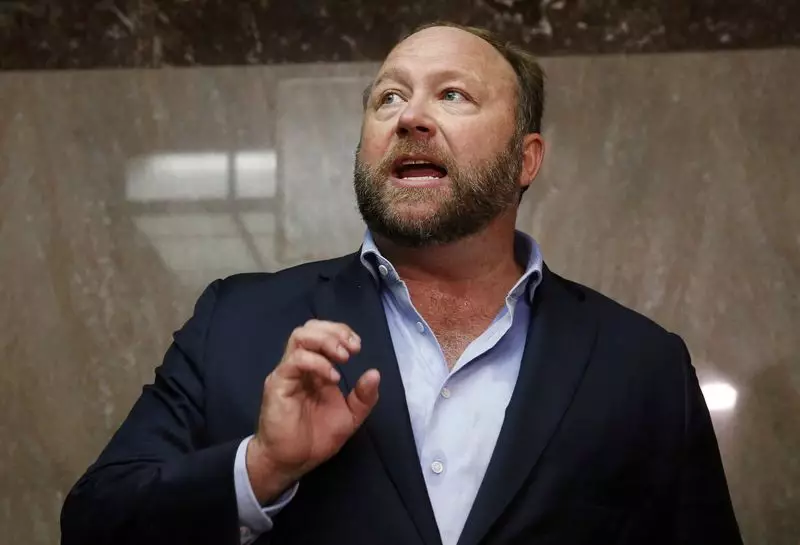The recent ruling by U.S. Bankruptcy Judge Christopher Lopez regarding the auction of Alex Jones’ Infowars website has sent ripples through both the legal and media landscapes. The judge’s decision to halt the sale to the parody news site, The Onion, highlights critical shortcomings in the auction process that unfolded in Houston. Lopez determined that the auction did not yield sufficient bids and indicated that a significant misstep occurred when the court-appointed bankruptcy trustee prematurely sought final offers, rather than allowing for a more comprehensive bidding process. This ruling not only raises questions about the integrity of the auction process but also ascertains the continuing legal and financial turmoil surrounding Jones, who has amassed over $1.3 billion in court judgments linked to his defamatory statements regarding the Sandy Hook tragedy.
To understand the gravity of the situation, it’s essential to contextualize Jones’ bankruptcy filing and the repercussions that followed. Jones declared bankruptcy in 2022 after being found liable for defamation against the families of Sandy Hook victims, claiming that the tragic shooting was a hoax. As a result, he has been entrenched in a legal quagmire that has pushed his financial status to the brink. The court’s decision underscores the precarious position that many creditors find themselves in, with the Sandy Hook families being the largest among them. The families have tirelessly fought for accountability, demonstrating remarkable resilience despite numerous legal obstacles.
Judge Lopez’s decision illuminated the nuance in the bidding process where an apparent conflict lay between The Onion’s innovative approach to the bid and the assertions made by First American United Companies—Jones’ affiliated entity. The Onion’s bid was creatively structured, benefiting from familial support that the judge seemed to view with skepticism. Meanwhile, Jones’ camp pushed back vigorously, accusing the auction of bias and collusion. Lopez’s ultimate conclusion was clear: neither offer met the necessary financial bar, compelling him to instruct the trustee to reevaluate the process and ensure a fair chance for any potential buyers to invigorate the bidding dynamic.
The ruling has complicated the landscape for those seeking repayment for the damages wrought by Jones’ misinformation campaigns. With over $1.3 billion in judgments against him, the families involved look increasingly to the dissolution of Infowars not only as a means of recouping their losses but also as a pathway toward vindication. Chris Mattei, representing the families, articulated their continued perseverance in the face of adversity. Their unwavering resolve serves as a reminder of the personal stakes deep within the bankruptcy proceedings—beyond just dollars and cents lies the quest for accountability and justice.
The contradictory nature of this situation lays bare the inherent complexities of bankruptcy law, particularly as it relates to the interplay between debtor rights and creditor claims. Judge Lopez’s remarks acknowledged the unfortunate oversight on the part of the bankruptcy trustee that led to a less-than-optimal bidding outcome. His direction for a reopening of the auction may offer a lifeline not only for those aggrieved by Jones’ actions but also epitomizes the desperate need for transparency and fairness in these legal machinations.
As the dust settles, it remains to be seen how the auction will evolve and who, if anyone, may ultimately emerge victorious in the quest to acquire Infowars. The Onion’s CEO, Ben Collins, voiced disappointment but signaled the site’s intention to remain engaged in the process, contributing to what was pitched as a vision for a more responsible internet. This contrasts sharply with Jones’ aggressive media approach that has proven divisive and misinformation-capable.
The push to transform Infowars into a parody site raises more than a few eyebrows. What would such a transformation mean for the current landscape of information dissemination? If successful, a rebranded Infowars under The Onion could precipitate necessary discussions around the ethical ramifications of digital content and the role of media in shaping public perception. As the tension between transparency and sensationalism persists, the legal wrangling over Infowars will undoubtedly ripple through media, law, and societal discourse, raising critical questions about accountability, morality, and the multifaceted nature of truth in the digital age.
The Infowars bankruptcy auction has illuminated the persistent challenges at the intersection of law, media, and public accountability. The road ahead is fraught with uncertainty, but it also presents an opportunity for systemic reflection on the role of irresponsible media and the vital need for reform.

